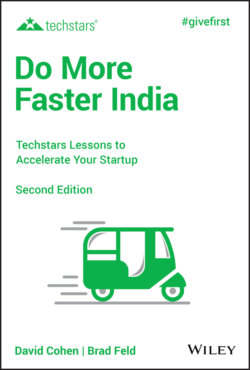Читать книгу Do More Faster India - Sacca Chris, Chris Sacca, Brad Feld - Страница 22
Chapter 6 Get Feedback Early
ОглавлениеNate Abbott and Natty Zola
Nate and Natty are the cofounders of Everlater, an easy and fun way to share your travel experiences. Everlater raised capital from Highway 12 Ventures after completing the Techstars accelerator in 2009. Everlater was later acquired by AOL/Mapquest. Nate is now head of product at Front and Natty is currently the managing director of the Techstars Boulder accelerator.
When we set out to build a travel website, we were two finance professionals with zero practical knowledge of software development or how to run an Internet company. We didn’t know what we didn’t know. So, as an absolute necessity, we set out to share our ideas early and often with as many smart people as we could find.
First, we reached out to any of our friends and family who would talk to us. While our network wasn’t rich with savvy Internet personalities or experienced engineers, we knew a lot of folks who wanted to see us succeed—and most of them traveled! We talked to them about how they found hotels, whether they liked scrapbooks, and whom they trusted online. We shared our opinions and received loads of feedback. From this, we stitched together a Frankenstein monster of an idea from our experiences, perceived market needs, and the invaluable advice of friends and family.
With our Franken-idea in hand, we set out to implement it. However, since we were new to programming, we had no experience and few resources with which to teach ourselves. As a result, we turned to the developer community with questions and open minds. Without their support, guidance, and ideas, we would have been lost. It also made our project more fun, as we got lots of smart developers helping us to realize our idea. Many of their suggestions became the backbone of our company.
Finally, we had to turn our science project into a real company. Our philosophy was to meet with anyone and everyone we could. We never knew what experience or ideas would come from the people we met, and we believed people have a sneaky way of surprising you with the unexpected.
As we progressed, we realized that even experienced entrepreneurs forget to get enough feedback on their ideas. We regularly experienced this every time we used a piece of software or web service that wasn’t well thought out. Even as we became a more mature (although still very young) company, we still shared ideas early and often, not just with mentors, but also with our customers and partners. We hope that the advice we’re gleaning today will pay dividends as large as the ones we’ve already received.
Now that we get asked to give feedback to other startups we meet, we see a clear pattern. Many entrepreneurs are hesitant to share too much about what they’re doing and, even when they do, they hold back some of their thoughts when talking to people who could be incredibly helpful to them. These entrepreneurs overvalue their ideas. They should be doing the opposite and shout about what they are working on from any rooftop they can find. Getting feedback and new ideas is the lifeblood of any startup. There is no point in living in fear of someone stealing your idea.
David Cohen once told us that you can steal ideas, but you can’t steal execution. As first-time entrepreneurs, we quickly realized that we had many ideas every day—some good ones but many that were crummy. As we discarded the crummy ideas and started focusing on the good ones, we realized how difficult it was to implement them well. We concentrated—with our small team—on becoming execution machines, as we decided that this was going to be the key to turning our Franken-idea into something amazing.
By sharing our ideas with smart people, the early advice and feedback gave us a wealth of ideas and options to consider and a framework with which to address the important questions that arose while starting a business. It helped us get into Techstars, where we were lucky to build a network of people who understood and were involved with our idea to help solve the problems we faced on a day-to-day basis. As a result, we’ve found great mentors, made lifelong friends, and enabled ourselves to build a much better business.
Nate and Natty wouldn’t have been accepted into Techstars if they hadn’t been naturally good at sharing their ideas early and often and seeking feedback. When we met them six months before they applied to Techstars, we were skeptical because they were just two ex–Wall Street guys with no technical skills or experience. We kept in touch with them while they taught themselves how to program and made significant progress on the product in a short time. We were amazed and encouraged them to apply to Techstars. This was a direct result of Nate and Natty sharing their ideas with us early.
We are often asked if you have to be technical to start an Internet company. While it certainly helps, Nate and Natty taught us that it is not a requirement. They also showed us that if you aren’t technical, there’s no reason why you can’t learn how to be a software developer if you are a smart human who can learn how to sling code. Their story inspired Brad to write a series called “Learning to Program” on his blog.
Natty Zola from Everlater and Emily Olson from Foodzie celebrate doing more faster during the summer of 2009.
